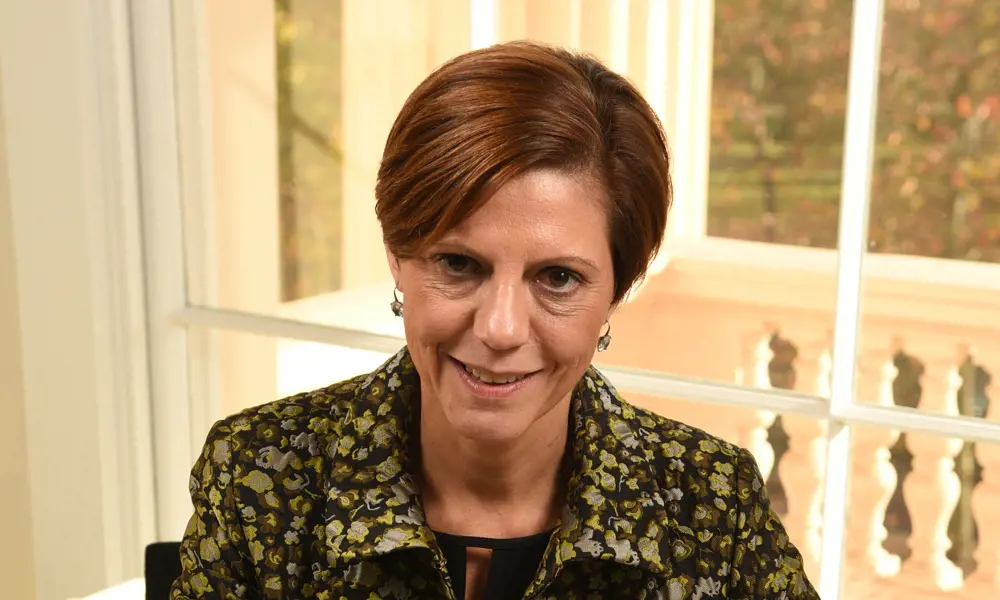
Facing engineering’s ultimate challenge
The need to plan and prepare for that scale of unprecedented global disruption and personal impact isn’t a normal part of most engineers’ training. If anything, it is nearer to Dr Freitas dos Santos’s parents’ expertise. Her mother is a sociologist while her father is an economist. At school she was interested in science, maths and physics. She enjoyed biology and biochemistry, which prompted her to study for a five-year bioprocess engineering degree at the Catholic University of Portugal in Porto. One reason Dr Freitas dos Santos picked her course was that there was an option to spend a year in industry or doing applied research.
Introduction to engineering
For her year off campus, Dr Freitas dos Santos worked with Unilever near Rotterdam in The Netherlands. This convinced her that she liked travelling. “It was very exciting, travelling and meeting people from different backgrounds, listening to different languages.” She admits that Dutch wasn’t an easy language to learn, but Unilever was a multinational business, “an R&D setting with a lot of collaboration programmes with other countries.” Her supervisor was a British chemical engineer, and everyone spoke English. “You get comfortable not using your own first language,” she says. “It opened my eyes, not just to feel confident to move to a new country, but actually seeing R&D within industry.”
“A thread in my career that I still absolutely love is innovation,” she says. “It just appeals to me – translating something that can start quite theoretical into something that you develop and put into practice.”
It was always the application of research that appealed to Dr Freitas dos Santos. “A thread in my career that I still absolutely love is innovation,” she says. “It just appeals to me – translating something that can start quite theoretical into something that you develop and put into practice.” It all goes back to engineering, she insists. “Engineers like to build things, to find a solution, to solve a big problem, to translate something that works on a very small scale into something that could be available to everyone. The translation of research into development and eventually something that people can hold, like a medicine, that starts from brilliant ideas in the lab.” Dr Freitas dos Santos picks an example to explain what she means. “When you see someone with a GSK asthma inhaler in their hands, it makes me very proud to have been one of the many people in the extensive team that made that medicine a reality. It has always been a very large, multidisciplinary team,” she adds quickly.
Her introduction to engineering in action was in a very different domain from the pharmaceuticals that she has worked on for more than two decades. At Unilever, she worked in food engineering and rheology. The challenge was to develop shelf-stable desserts for regions where refrigeration was a problem, such as in some more remote areas of South America. So, she set out to study what sort of formulation could withstand inconsistent refrigeration.
The project started on a small scale in the lab, backed up by theoretical analysis and simple mathematical models. That looked promising, so it was time to try things out on a larger scale. “I remember transforming the floor of the pilot plant into a giant sticky foamy layer because I did not quite get the right formulation in my experiments and mixing modelling. Instead of a very nice clear liquid in the reactor, I had this massive amount of foamy gelatine that got everywhere. That was quite a good experience that made me ‘very popular’ with the rest of the pilot-plant technicians and engineers, as you can imagine,” she laughs. “That was one of my first-hand examples of the need to do more work, and predictive modelling on a small scale before you go to a large scale.”
Dr Freitas dos Santos says that, far from putting her off, she enjoyed the experience. “I loved it. I said, ‘oh my gosh, there is something that I need to solve’. It is not going to be so easy.” The experience taught her the importance of talking to more experienced engineers, and the need to learn about scale up before trying things out on the plant. She has followed this guidance throughout her career.
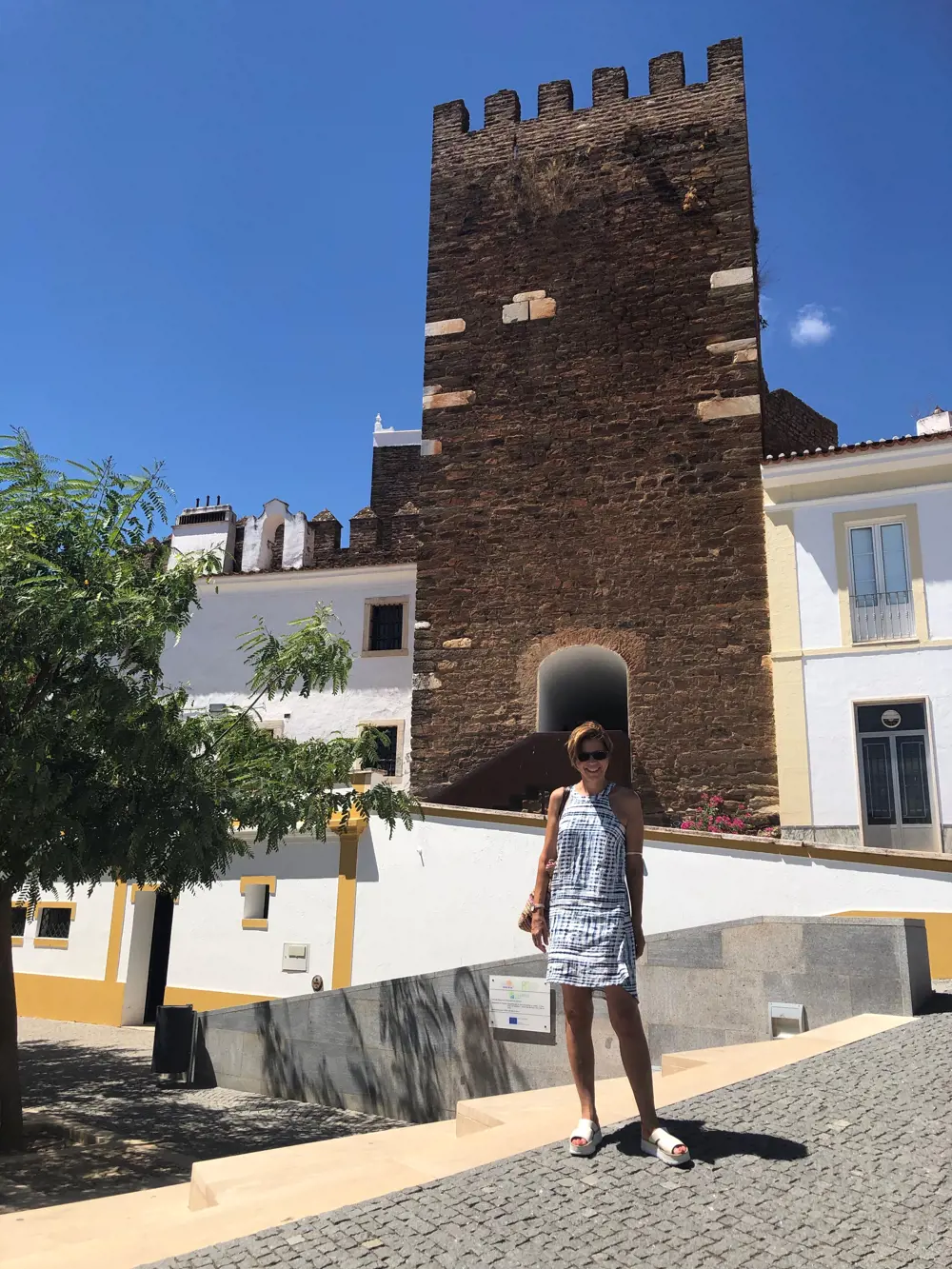
Dr Freitas dos Santos in Alentejo last summer. Her two favourite regions in Portugal are Alentejo and Porto and the Douro Valley, the latter her home region, “the most beautiful part of course. I am not biased at all.”
An appetite for travel
Foreign travel remained on the cards after Dr Freitas dos Santos graduated. She won a scholarship from the Portuguese government that allowed her to travel abroad to choose a research programme that interested her. Her university tutor in Portugal was keen for Dr Freitas dos Santos to go to the US, instead she chose the UK. She was drawn to London as a city and to its cultural attractions. “I love modern art,” she says enthusiastically. After checking out Cambridge and UCL, she settled on Imperial College London.
Her PhD in bioreactor design involved looking at volatile organic compounds – gases emitted from some chemical processes that may have adverse health effects – and using a biological approach in the control of pollution. Her research took her into waste minimisation and remediation. “I had a real interest, which I still hold, in sustainability. The idea of developing processes and products in a sustainable manner was always of interest to me.” Dr Freitas dos Santos continued to support this activity at GSK. To her, sustainability is also important when making pharmaceuticals.
At Imperial College London she had begun to develop an interest in using biochemical processes to make medicines. There were plenty of researchers in the university working on different cell cultures, mammalian cultures and so on. “There was a lot of excitement at the time in terms of using bioprocessing to produce novel molecules such as monoclonal antibodies. It really captured my interest in pharmaceutical and biopharmaceutical processes.” Although this was not her direct research area, Dr Freitas dos Santos confesses to hanging about in different laboratories and departments and checking out what everyone else was up to. “That is still the case. I am still curious and interested in what is happening in the lab next door.”
A start in pharma
For Dr Freitas dos Santos, the move into pharmaceuticals happened a while after. Her first plan was to translate her lab research at Imperial College London into a usable technology. Her doctorate, on using bioreactors to treat wastewaters from chemical processing, was the basis for a spinout business, Membrane Extraction Technology (MET) Ltd set up in 1995, which used separation technologies aimed at treating complex halogenated chemical compounds – tricky materials to deal with and render safe for final disposal.
This was at a time when it was becoming more frequent for academics to turn their research into potentially profitable spinout businesses. As part of a small startup team, Dr Freitas dos Santos and her fellow founders could tap into government grants and matching funds from industry, as well as securing venture capital.
MET’s first big project was with chemical company ICI at Hillhouse near Blackpool. It was an opportunity to design and install a pilot plant in a polyurethanes production unit at ICI, then still a key player in the UK’s chemical processing industry. “It was a fantastic opportunity. It gave me a huge amount of responsibility early in my career.” It meant managing safety and containment challenges, setting up a new facility next door to a large phosgene plant. “You can imagine the safety measures required, and the rigour in terms of risk assessment, engineering controls and process safety. I learned an absolutely huge amount. The people I worked with were incredibly generous in teaching me,” she adds. “They could have said ‘Who is this female engineer turning up from London?’.” On top of that, Dr Freitas dos Santos was still under 30, originally from Portugal, and the only woman on a site with hundreds of engineers, technicians and operators.
I am very lucky to have worked on a number of medicines that have gone all the way from research to file and launch, and are now taken by millions of patients across the globe
With MET’s business up and running, Dr Freitas dos Santos faced a very different challenge. She had acquired a fiancée who also happened to be a chemical engineer working in the same business in addition to his academic role. “To be honest, it was better not to work together,” she explains. That plan worked out. “We are still happily together,” she adds. “We have been together for over 26 years.”
As a result, she left MET to join what was, at the time, SmithKline Beecham, and now GSK. Her husband stayed on with the startup. Evonik Industries, a world-leading specialty chemicals business based in Germany, eventually bought MET in 2010. “It was fantastic to see it grow and then be acquired,” says Dr Freitas dos Santos. ‘’It is a very nice story.” Two decades after the origins of the business, it is still cited as an example of successful technology transfer at Imperial College London.
Moving into the pharmaceuticals industry took Dr Freitas dos Santos into new areas of chemical engineering. She joined the business working in R&D chemical development, where researchers take a synthetic chemistry route for a candidate active pharmaceutical molecule capable of producing a few grams. They then translate that chemistry into a robust process that can produce kilograms needed to supply clinical studies, and then eventually tons when it becomes a commercial process for an approved medicine. Dr Freitas dos Santos joined SmithKline Beecham as a part of the chemical and engineering teams that developed that process. “I am very lucky to have worked on a number of medicines that have gone all the way from research to file and launch, and are now taken by millions of patients across the globe,” she says. “It takes a long time. A medicine stays with us during development – six, eight, ten years.”
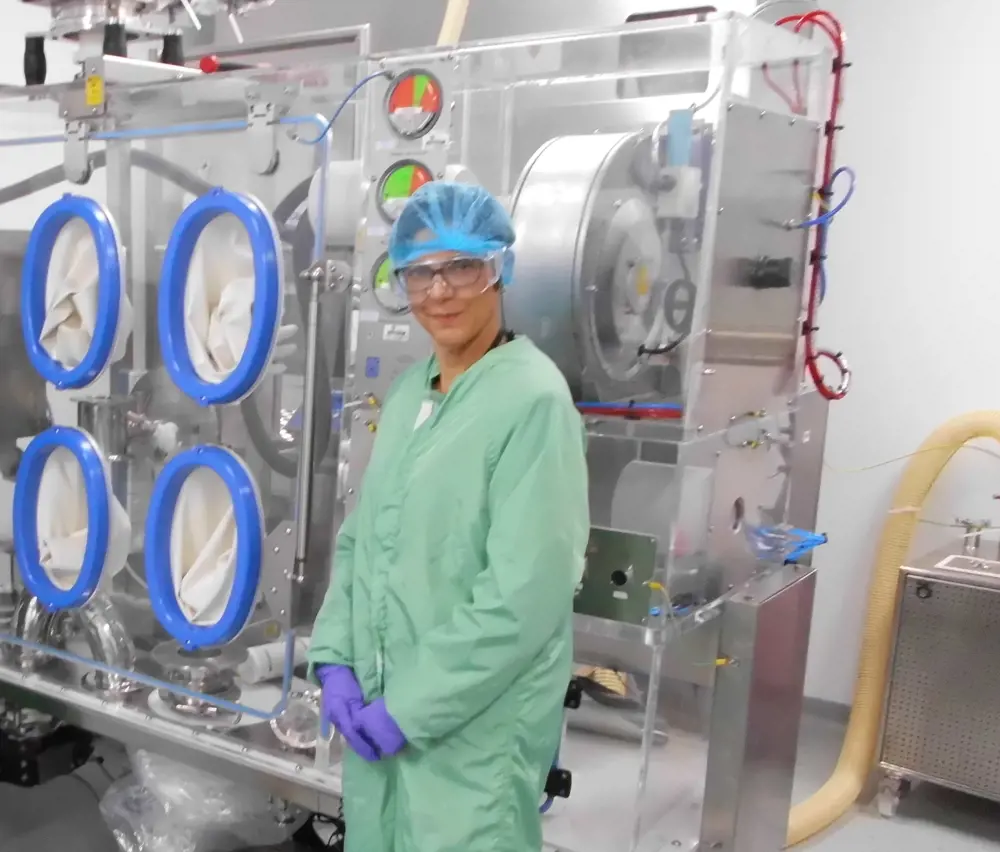
Dr Freitas dos Santos at the UK Drug Product R&D Pilot Plant
Adapting and thriving to new challenges
Dr Freitas dos Santos heads the global clinical supply chain at GSK R&D. Her group supplies pharmaceuticals for the company’s clinical studies, which means planning, making and supplying enough medicines to sustain more than 200 clinical studies taking place across all continents. She also manages labelling, packaging and distribution of clinical supplies for thousands of patients, across all the company’s therapeutic areas. “We have a lot of strength in respiratory and anti-infectives at GSK. In the last two to three years, the oncology part of the business has grown enormously and given new challenges to our clinical supply chain and our engineering teams, which is fantastic.”
As work progresses on a new pharmaceutical, Dr Freitas dos Santos’s group works with both the clinical development and the commercial manufacturing parts of the business to develop the processes needed to make new drugs in commercial quantities and collect all the necessary data to support regulatory files. This is not the sort of activity that is easily put on hold while a business grapples with new ways of working during a pandemic. Starting in Singapore, the whole clinical supply chain operation had to adapt. “We didn’t lose a single day,” she said. “When the virus started moving towards Europe in March, it became very apparent to us that we would have to implement measures in response to lockdowns, first in our UK groups, followed very quickly by the US groups. The absolute focus was the safety of our people across all our facilities, then our continuity of supply to patients. People’s flexibility, creativity and commitment has been amazing. We had to introduce rotas, including in many cases working at weekends, to ensure continued delivery while maintaining required social distancing in the labs and in the pilot plants.”
Businesses always have contingency plans to deal with unexpected events. “We were very well-prepared in terms of having clear business contingency plans,” says Dr Freitas dos Santos. The pandemic put GSK’s plans into overdrive. “The reality of this pandemic was that we had to trigger every single business contingency plan we had for every site, for every group, I never thought that I would be doing this simultaneously across the globe.’’
Dr Freitas dos Santos still sounds amazed and proud that, after a year, her teams continue to operate across all the countries and support all those clinical studies. In all, her team of around 400 people operate at a site in Singapore, three in the UK, and three more in the US. “We quickly established a COVID-safe environment, and once implemented about half of my group remained working on site in our labs, pilot plants, packaging, and distribution lines. We are passionate about helping others and we knew that we needed to keep delivering medicines for critical clinical studies. COVID has made it very clear what we do and the impact we have on people and society.” The other half of the group does clinical supply chain management, planning, data and system support, patient randomisation – all those colleagues are working still from home a year on and doing a brilliant job.”
It wasn’t just a case of feeding the existing medicine pipeline at GSK; developing better medicines to treat patients with COVID-19 is also a key focus for the industry. So, in addition to the day job, Dr Freitas dos Santos was a part of the company’s COVID solutions team. “I had the privilege to join our enterprise effort that assessed the molecules already in the portfolio that could support COVID treatments.” The company set out to quickly assess them to see if there was something that could potentially work to treat people suffering from COVID-19 symptoms. They went on to progress one molecule into a clinical study as well as establishing a key collaboration with Vir biotech on another candidate currently in late-stage studies.
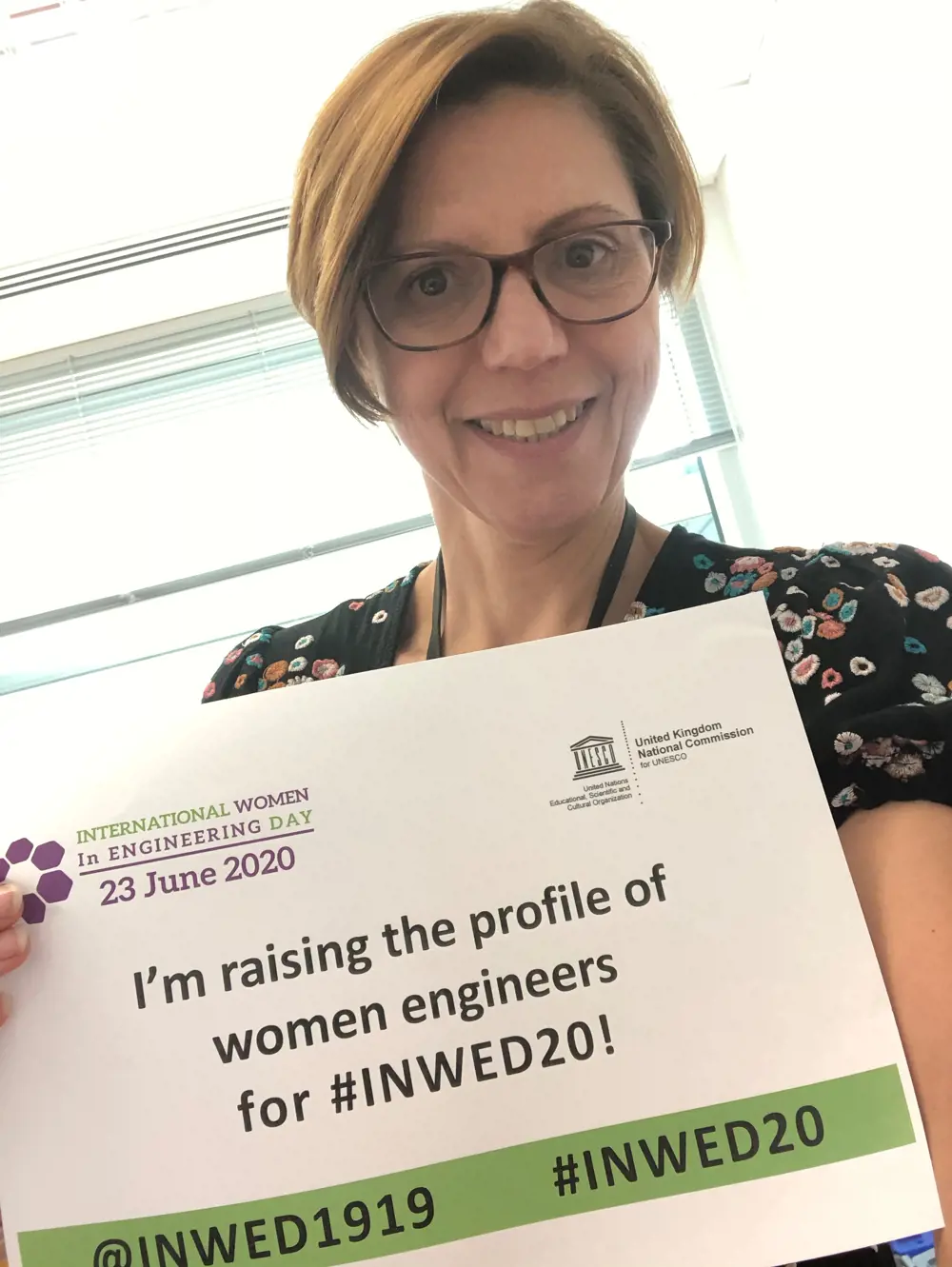
Dr Freitas dos Santos promoting International Women in Engineering Day in 2020
A passion for diversity in the workforce
Another important role that Dr Freitas dos Santos cannot put on hold, and one that she is passionate about, is in GSK’s pursuit of diversity in its workforce. She sees this as being far more than attracting and promoting female talent and is part of a group in the company that champions scientific career development and the wider diversity agenda. “You can’t just say ‘okay, gender balance is much better now’ and the work is done,” she explains. “I’ve been able to grow and lead at GSK and I also understand how I’m a role model to many. But of course, it’s about more than gender. As a company, we are also looking at a much more comprehensive view of inclusion and diversity.” Dr Freitas dos Santos talks of ‘full diversity of background’. For that to happen, we must think about engaging people who don’t even apply for jobs because, as she puts it, they don’t see themselves in those roles. She insists that ‘’if we really want to transform inclusion and diversity, and not just have one or two people as token examples, organisations need to look at how they attract, recruit and develop talent; how we advertise jobs; who we have in recruitment panels. And once in the organisation, we need to use our network of mentors to support career progression, for example this is something we do as part of the GSK Fellows Programme.”
but she didn’t look at me. She just looked at the shoes and said, ‘I never thought an engineer looked like you'
Career timeline and distinctions
Studied bioprocess engineering at the Catholic University of Portugal, 1986–1991. PhD in chemical engineering at Imperial College London, 1991–1994. Technical Director, MET, 1995–1997. Joined GSK, 1997. Fellow, Institution of Chemical Engineers, 2014. Attended the University of Chicago Booth School of Business, 2010. GSK Senior Scientific Fellow, 2017. Fellow, Royal Academy of Engineering, 2019. Vice-President, Global Clinical Supply Chain, GSK, 2015 to present day.
Dr Freitas dos Santos believes that it is important to start early if you want to encourage people to enter the profession. For some time, she has worked with school students, especially girls, to improve their understanding of engineering and what engineers get up to. “It is not an obligation, but something that I really enjoy,” she stresses. Such visits can reveal how seemingly simple things can influence youngsters. “I remember once when I arrived at a school, I talked about what an engineer does in pharma R&D.” Her enthusiasm for engineering wasn’t the only factor that struck her young audience. For one teenage girl at least, it was another of Dr Freitas dos Santos’s passions. “I like shoes, a lot! I can’t remember if I had very bright pink, suede high-heel shoes or one of my leopard-print pairs on,” she explains, “but she didn’t look at me. She just looked at the shoes and said, ‘I never thought an engineer looked like you’.”Dr Freitas dos Santos says that visiting schools and talking to young people about the life of an engineer is just one activity she has missed during lockdown, in addition to seeing her team members across the globe. You can do a lot of things in virtual events she says, but adds: “I like the informal conversations. I like talking to people.”
After more than a year working with all those business contingency plans in place, Dr Freitas dos Santos is keen to see some sort of return to normality. “I am looking forward to having everyone vaccinated and going back to normal, perhaps a new normal,” she says. She misses the social interactions, internally related to engineering and work, and the family interaction. With her family in Portugal and her husband’s family in New Zealand, home schooling their two children has been a priority. “We always relied on travelling for family reasons and having that interaction.” At least her teenage children, along with family and friends, have a clearer idea of what she gets up to for a living. She laughs, “suddenly there was a lot of interest in what I do”.
***
This article has been adapted from "Facing engineering's ultimate challenge", which originally appeared in the print edition of Ingenia 86 (March 2021).
Keep up-to-date with Ingenia for free
SubscribeRelated content
Design & manufacturing
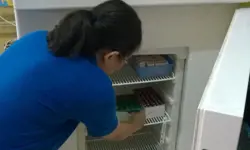
Super cool(er)
Welsh startup Sure Chill has developed a cooler that uses the properties of water to keep its contents cool for around 10 days without electricity. This is ideal for storing items such as vaccines where electricity sources are unreliable.

R&D investment makes good business sense
In just five years, Dr Ralf Speth FREng has presided over a revolution in design and manufacturing that has helped create a new family of engines and has overhauled Jaguar Land Rover (JLR) production facilities.

Steel can arise from the ashes of coal
Thousands of people were laid off in the UK steel industry in 2015 and there are pessimistic future forecasts. Professor Sridhar Seetharaman of the Warwick Manufacturing Group argues that smaller, flexible steel mills implementing new technology would better cope with fluctuating global trends.
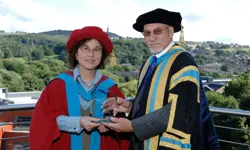
Integrating metrology in business and academe
Professor Jane Jiang’s interest in measuring began when she worked on a bus production line in China. She found that the best way to improve quality, consistency and productivity was through metrology, the science of measurement. Today, she runs the UK’s largest metrology research group.
Other content from Ingenia
Quick read

- Environment & sustainability
- Opinion
A young engineer’s perspective on the good, the bad and the ugly of COP27

- Environment & sustainability
- Issue 95
How do we pay for net zero technologies?
Quick read

- Transport
- Mechanical
- How I got here
Electrifying trains and STEMAZING outreach

- Civil & structural
- Environment & sustainability
- Issue 95